West Cork business is harnessing power of a superfood: seaweed
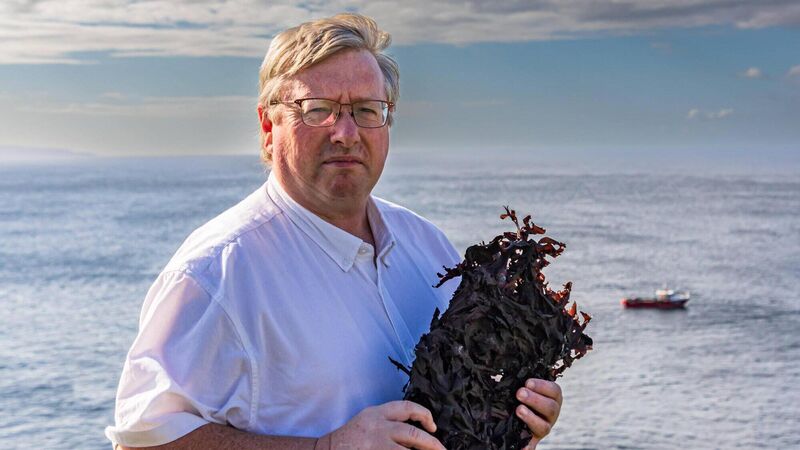
Michael O’Neill, CEO of Pure Ocean Algae in West Cork, which is doubling its staff to 12 full-time.
COUNTY Cork has 1,200km of coastline and one of the richest marine habitats in the world.
If we considered what the ocean could contribute to our food system, imagine the possibilities: An untapped food source, a way to enhance food grown on land, establishing a new industry keeping jobs and people living and thriving in coastal communities.
The seaweed industry has the highest potential for growth in the Irish aquaculture sector and has always been a supplier of high-quality seaweeds for various uses. But how to scale seaweed farming has held back the tide of progress for years.
Yet, down at the furthest extremity of the county, hanging onto the edge of the land in Allihies, biotechnology innovator, Pure Ocean Algae, has cracked the code and is ready to ride the wave of seaweed’s burgeoning, and global, potential.
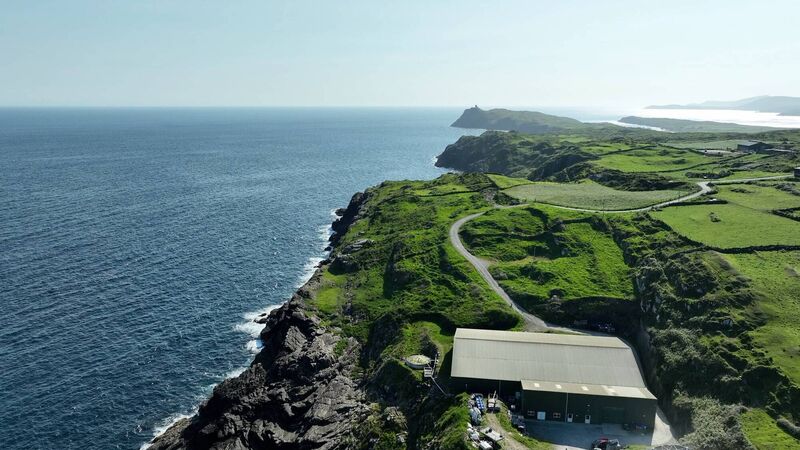
The Beara Peninsula has been a part of Michael O’Neill’s family going back so far, even he is not sure. Seven, maybe more, generations have farmed the harsh acreage of land with suckler cows, as well as a proud fishing heritage that Michael himself was once part of. An engineer by education, he is motivated by understanding a problem and finding resolutions and ways to improve.
In 2010, Michael and his wife Aileen created Ireland’s first artisan sea salt, Irish Atlantic Sea Salt. One variety is flavoured with dulse, a seaweed that grows abundantly around Ireland’s coast with a strong tradition of consumption.
Aileen manages daily operations of Irish Atlantic Sea Salt leaving Michael to sink his teeth into a project on a whole different scale: farming seaweed.
Seaweeds have been long known as a source of high-quality protein, abundant in a myriad of trace minerals such as iodine, calcium and magnesium, as well as a natural source of essential vitamin B12.
It is a supercharged food source.
Yet, accessing seaweed is a story of extremes. On one hand, hand picking and harvesting makes any kind of large-scale profitable business an impossibility. On the other, is the spectre of large-scale harvesting of wild-grown seaweeds with the potential to destroy delicate marine habitats which may never recover.
Since their seaweed farming licence was granted in 2019, Pure Ocean Algae have worked to create a third option that, like any good engineering problem, removed all the bad stuff and reimagined something even better with what was left.
“We recognised quite quickly that if we were to take [seaweed] forward, it was going to take a lot of research and a lot of time. We started looking at red seaweeds; we had done some work previously on dulse and there’s a history of eating dulse up and down the coast of Ireland.
We decided to move slowly and develop protocols to grow something that other people necessarily can’t grow.
Michael attended a conference in Galway exploring seaweeds for health, and his attention was caught by a presentation of UL’s biochemistry department and University of Ulster Coleraine’s Centre for Diabetes. Their research looked at how different protein constituents could affect type 2 diabetes, specifically a lactose protein derived from the Palmaria palmata seaweed, otherwise known as dulse.
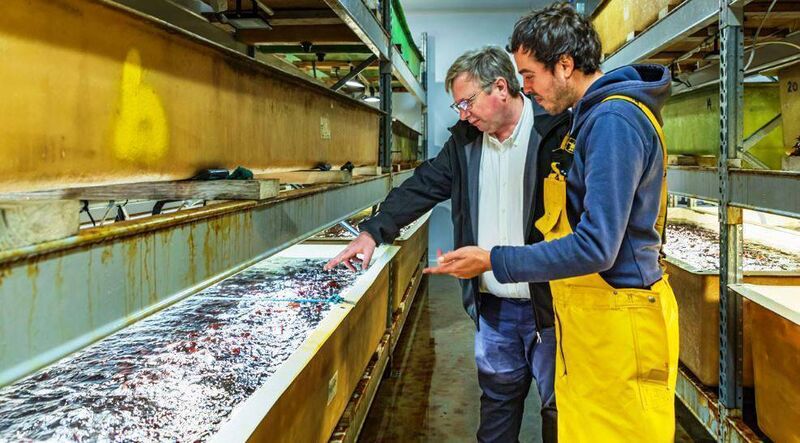
“I think you need a greater reason for these things; it’s not just about food. It got me thinking that this was something we could do.”
Researchers had identified a highly functional plant-based protein in Irish dulse that could be beneficial in regularising glycaemic index of diabetics. But there was a major obstacle.
“The issue was all about supply of raw material. That stuck with me, and the next day I contacted UL, sat down with the researchers, and told them I was looking to develop seaweeds and we had licences.”
The next problem Michael had to solve was the size of his company. It was, everyone agreed, too small to take on something of this potential.
A week later, the government announced a new Disruptive Technologies Innovation Fund. Pure Ocean Algae gained a key strategic and development partner in another West Cork-based innovator, Carbery Group, and along with Dr Meave Edwards of Galway-based Irish Seaweed Consultancy, put forward the BioDulse project, and was awarded €2 million of funding in October 2019.
“The project is in two parts: development of capacity to commercially grow Palmaria palmata; the other to develop a protein fraction and trials around its functionality in humans, which concluded in October this year. I think we’ve succeeded with everything we have attempted so far as a consortium.”
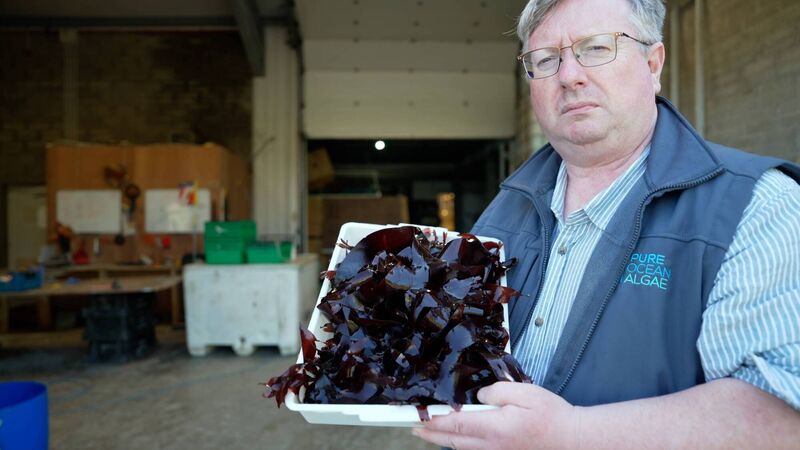
Pure Ocean Algae was charged with developing the capacity and capability to provide biomass, namely dulse and kelp, by farming seaweed on a large scale untenable to take from the wild.
“We have that well and truly sorted,” says Michael. “In 2022, we were able to go full cycle, and can now grow our own reproductive material. That’s above what we hoped to achieve by this stage.”
Unlike plants on land that reproduce through pollination and seeds, seaweeds multiply by releasing spores or simply by adult plants fragmenting. Initially, the hatchery was populated with seaweed biomass collected from the ocean, but now the farm is largely self-sustaining, aside from an infrequent refresh of wild material to maintain a healthy diverse gene pool.
The hatchery is a 20,000 square foot state of the art facility that sits back from a cliff edge above the ocean. Inside are refrigerated rooms with rows upon rows of open-topped tanks that look like seaweed jacuzzies. Bubbling away under simulated daylight, the tanks are filled with delicate purple dulse at different stages of development.
Some seaweeds will grow to full maturity in this land-based facility, providing potential for year-round supply of biomass to harvest. There are also 40 hectares of licensed, multi species seaweed growing sites in the ocean, where seaweeds are grown on a rope system, not dissimilar to the method use for rope-growing mussels.
While dulse is the primary focus for Pure Ocean Algae, Michael’s team are also cultivating Alaria esculenta (Atlantic wakame), Saccharina (sugar kelp), and Laminaria digitata (knotted wrack).
“After focusing for four years on dulse, we needed to expand our horizons into kelps. We’ve mastered the lifecycle of dulse to the point of almost domesticating it, but it’s a lot more expensive to grow and you need large holding capacity. The kelps can be done straightforwardly; you just need room and people, and we have both.
“We have a drying and milling facility on land, we have our hatchery, and we have two sea sites in Rossmacowen (near Castletownbere). We’re looking for more licencing and we’re looking to work with those with [seaweed farming] licence applications underway.”
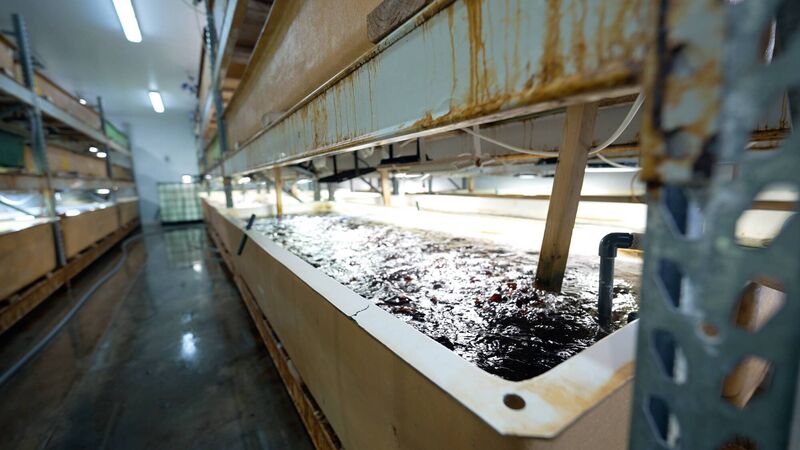
All this points to major expansion in both cultivation and capacity in 2024. From the company’s inception, Michael’s vision has been about the ability to deliver a complete process from spore to final product, combined with the spirit of Ireland’s well-proven co-operatives applied to aquaculture.
“It’s not about control; it’s about us trying to help the sector. We’ll all make money at the end of the day, and the seaweed farmers must make money. The realisation is farmers need to be looked after and they need to have a structure available to them without having to get one of their own. I’m in no doubt that many of them can, we’re just giving them an easier option.
“It’ll change as things develop, but we hope we can put in place the processing capability for high volumes of high-quality seaweed and the ability to get the seeded material. We’ll be there in the mix, as well as doing that for our own farms.
You need champions in the industry.
"We’ve got the plan, and we’ve actioned it: we’ve had one round of funding and we’re well on the way with the second, and we hope things will go the way we’re planning and that’ll be channelled into the greater industry as well. We have a huge opportunity here from a geographical perspective; we’ve a great location for growing seaweed on north and southwest coasts of Ireland.”
The milling facility is currently able to handle two of the four seaweed crops.
“We have different mill specifications for dulse and Alaria. Next year we’ll have the three different species in any kind of mill size and powder format. We’re looking at supplying a food supplement into Hong Kong where our seaweed products are well appreciated and understood.”
Accessing a market by tapping into a deeper cultural understanding of the nutritional benefits of seaweed provides expedient financial returns which in time can be channelled into developing markets domestically and in Europe.
Most of the milled products have culinary use, in baking and as seasonings, but a superfine poweder is also encapsulated and sold as a food supplement with a high iodine content, and typically 20% protein content.
However, Pure Ocean Algae has developed a process where is can naturally increase the protein level of dulse up to 40%, which can then be put through a process called a “cascading biorefinery” where protein can be extracted followed by various other high value fractions. The concentrated protein isolate brings Michael back to that very presentation in Galway, and the research project that identified it as a potential game changer in the management of type 2 diabetes. And that is very exciting.
Research and development is in its early stages, yet millions of euros have already been invested. This is a business venture, but the guiding principle is doing good for others.
As well a powder for food and food supplements, the seaweeds have been adapted for use as plant fertilisers providing marked improvement to drought resistance, and there is future potential for application in the medical space, too.
Seaweeds grown on ropes in the ocean require nitrates, carbon, and phosphate to grow. To that end in Norway, Michael tells me, seaweed farms are sited adjacent to salmon farms. Salmon farms have been slated in recent years for leaching excessive amounts of precisely these three nutrients into the seas leading to degradation of marine environments. Farming seaweed, therefore, can clean the oceans.
“When the oceans are cleaner, they work better,” says Michael, “the eco systems work as they should, and we can facilitate that.”
Michael O’Neill has found a way to tap into a natural resource not only without harming the marine environment but that’s beneficial for it.
He has found a high worth business proposition bringing high value jobs to extremely rural communities of our coastal villages, building an integrated infrastructure to benefit all existing and future seaweed farmers in Ireland, and developing global markets for their product.
Seaweed really is a superfood.
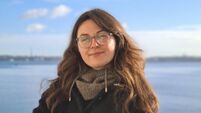
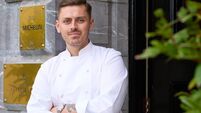
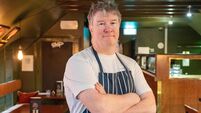
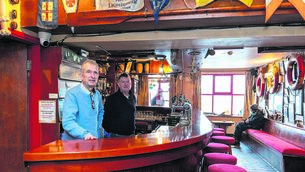



 App?
App?


